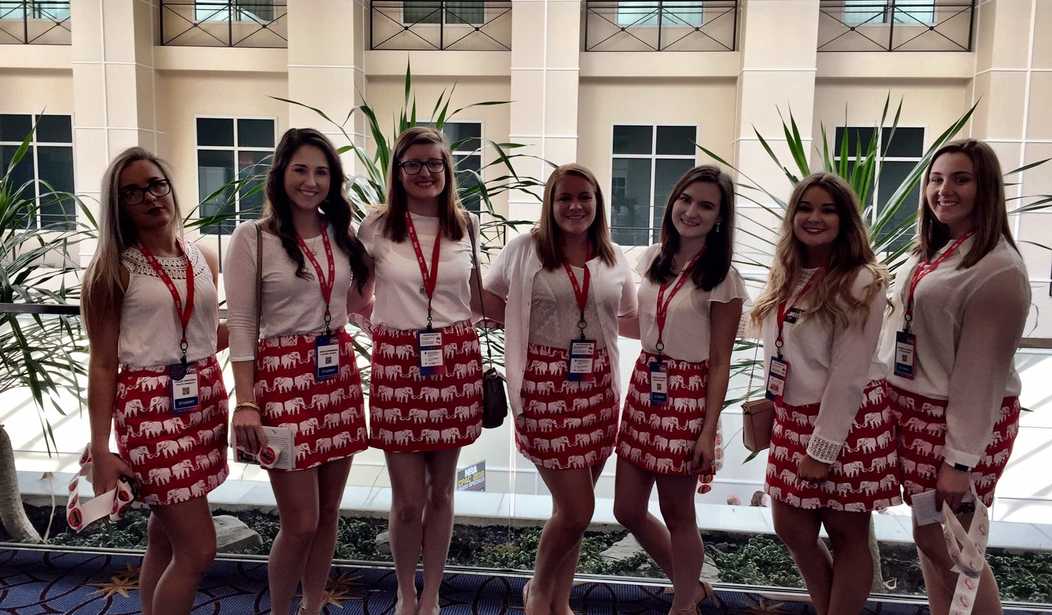NATIONAL HARBOR, Md. — The best way for conservatives to appeal to millennials may be through their pocketbooks and their understanding of science, said a panel at the Conservative Political Action Conference (CPAC) on Friday. Science and technology push young people to oppose abortion, a key Republican position. Skyrocketing student debt and a horrible jobs market also squeeze young people economically, and the Republican Party might have the best answers to their dilemma.
Benny Johnson, creative director for the Independent Journal Review, cited a key moment in the life of every millennial: when she receives her first paycheck, and notices how much is taken out in taxes. Johnson compared this moment to Chris Christie’s public debacle, where he stood sheepishly behind Donald Trump on Super Tuesday — a moment which launched the hashtag #FreeChrisChristie and led Christie to publicly announce he was not “taken hostage.”
Did anyone see Chris Christie standing behind Donald Trump, screaming internally and staring into the abyss? The sentiment Christie was trying to tell us with his eyes is what every millennial thinks about their first paycheck. You worked your fingers to the bone — you were a waiter or some kind of manual laborer — and you look at how much of your salary is taken away. I think that is a tremendous staring into the abyss, screaming internally, moment.
Due to the amount millennials lose in taxes, Johnson argued that there is a lot of interest in economic freedom among young people. He asked the young people in the crowd at CPAC if they expect to receive any benefits from Social Security, and only one person raised his hand.
Rob Bluey, editor in chief of The Daily Signal, agreed with this analysis. He explained that many millennials no longer believe in the American Dream because they experience so much difficulty in entering the job market. “If you’re coming out of four years of college or more, and you’re carrying these huge loans, and you’re looking at your first paycheck and seeing how much the government is taking, why wouldn’t you have a pessimistic view of the world?”
Katie Pavlich, editor at Townhall, argued that this difficult economic situation explains why many young people are embracing a socialist candidate (Bernie Sanders), despite their opposition to what socialism really entails.
They get out of college with $100,000 in debt, and for the past eight years under Barack Obama, the unemployment rate and labor participation rate for young people is lower than it’s ever been since World War II. They can’t find a job. Your first ten years in the labor market actually determine your wage earnings for the rest of your life, and you have an entire bloc of millennials coming out of college into an economy where they have to fall into a cycle of dependency because they can’t find a job to pay off their loans on a bad degree.
Pavlich stressed that millennials don’t really like what socialism would entail. “It’s completely the opposite of what they believe in,” she argued. “Socialism limits choice and individualism — it doesn’t expand it — but they don’t seem to understand.”
Next Page: Millennials and Abortion
The CPAC panel was not entirely negative on millennials, however. Fox News co-host Dana Perino noted the Associated Press report that abortions are down in nearly all 50 states since 2010, and that the millennial generation tends to poll more pro-life than earlier generations. The panelists agreed that a major reason for the shift against abortion is attributable to recent advances in science and technology.
Bluey referenced now-ubiquitous ultrasound technology, which allows a mother and father to see images of the baby inside the mother’s womb. He argued that “when you see that ultrasound, and you have that experience which other generations could not have, that changes a lot of people’s views.” He also noted the pregnancy resource centers which are sprouting up around the country, purposefully set up near Planned Parenthood and other abortion clinics “to give women another place where they can discuss options.”
Johnson argued that science supports the pro-life position. He suggested using global warming as a conversation foil for the pro-life issue:
“Why do you believe in global warming?” A Democrat would respond, “Because science backs it up.” The follow-up question would be, “when does life begin?” And you just leave it open-ended.
Pavlich agreed, arguing that the pro-choice movement has become more radical as science and technology increasingly favor the other side. She mentioned the outrage from pro-choice organization NARAL, in response to the Super Bowl Doritos ad.
When you talk about how millennials take in stories on the Internet, that story went viral because it was so ridiculous that they would be upset about Doritos showing the reality of a child. I’m excited that the millennial generation is pro-life, and I think that science has been on our side for a long time on that issue.
Pavlich also insisted that “just because you’re a man doesn’t mean you’re not allowed to have an opinion” on abortion, and praised the millennial men who have been brave enough to take up the issue.
Next Page: The Best Way to Reach Millennials
Johnson ended the panel by discussing the best tool to reach millennials — the internet. He argued that “we understand the principles of virality” — a statement with which many in media vehemently disagree — pointing out South Carolina Senator Lindsey Graham’s viral response to Donald Trump giving out his cell phone number.
How to destroy your cell phone with Lindsey Graham https://t.co/grzvXDfwZ4
— Independent Journal (@INJO) August 4, 2015
“People want something unexpected,” Johnson explained. He showed the video, and declared that “60 million people saw that video, on broadcast or the internet.” Original, creative videos are a great medium to reach millions, especially millennials, with the conservative message.
This strategy has been employed by many of the leading candidates, especially Ted Cruz — whose campaign has unleashed hilarious videos attacking Trump and Hillary Clinton — and Marco Rubio — who released a great football video in response to a campaign flub. The verdict is still out on how effective these videos are at reaching and persuading millennials. This young reporter (at 26 years old) has certainly been entertained by them, but he was going to vote Republican anyway.
Reaching out to young people with the message of opportunity and economic growth, via social media and viral videos, may be a great path. As with all political movements, however, it will be difficult to keep up with changing trends. There may be a new generation of voters by the time political influencers truly master millennial messaging, and by then the entire ballgame may be different.









Join the conversation as a VIP Member